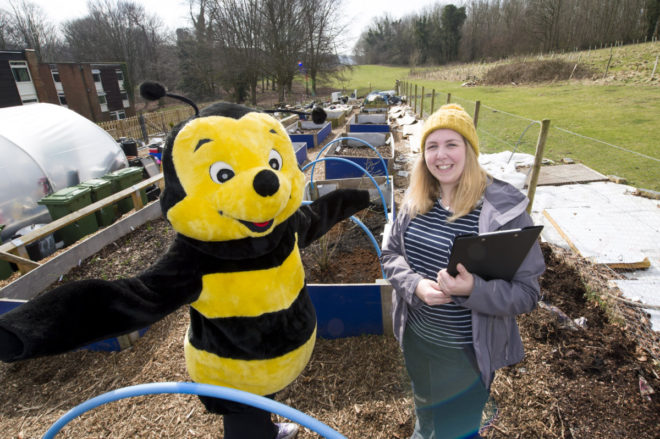Do you grow your own food? Team PollinATE, a ‘citizen science’ project run by the University of Sussex, needs your help this summer to collect valuable data about food grown in the city of Brighton & Hove. If you’d like to learn how to identify bees and other pollinators, find out how much your produce is worth and meet other growers, visit www.teampollinate.co.uk or come along to our Pollinator Workshop on 22nd April, 11-1pm at the BHOGG plot, Weald allotments- all welcome!
Scientists at the University of Sussex are looking for growers in Brighton & Hove to help them learn more about food grown across the city.
Approximately one fifth of the world’s food is grown in urban areas, yet we know surprisingly little about how it is produced. That’s why citizen-science project, Team PollinATE, is working with growers in Brighton & Hove to collect data on which insects pollinate crops in urban areas, how much food small city growing spaces such as gardens and allotments can provide, and the most common pest control methods used by urban growers. The project has also partnered with scientists in India, who are working with urban growers in Kolkata to collect similar data and give a global view of urban food production.
The project launched in April last year, and already volunteers have collected lots of useful data. After attending a workshop on pollinator identification, throughout the summer of 2017 volunteers conducted quick pollinator counts in their growing spaces (surveying over 17, 000 flowers in total, and spotting 850 insects!), as well as keeping a diary of any pest control methods used. To help us quantify how much food people are producing across the city, some volunteers kept a record of the food they harvested, and by using our handy ‘Garden Shop Calculator’ could find out how much their produce was worth- on average volunteers grew an impressive £425 worth of food last year, with some volunteers ‘saving’ up to £900 by growing their own.
This year the project is open to anyone who grows their own food, be that in an allotment, garden, window box or community growing space. So, if you’d like to learn how to identify bees and other pollinators, why not visit our website and register yourself as a volunteer or come along to our next pollinator workshop at the BHOGG plot (11-1pm, Weald Allotments- all welcome!). You’ll receive a pack with more information on how to participate and monthly updates on the findings.
For more information, visit our website www.teampollinate.co.uk or email Team Pollinate co-ordinator, Beth Nicholls info@teampollinate.co.uk.

